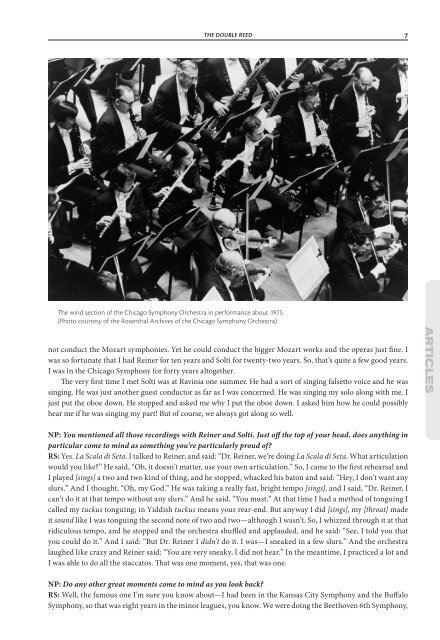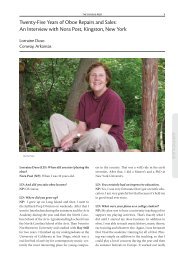Ray Still - Nora Post Inc.
Ray Still - Nora Post Inc.
Ray Still - Nora Post Inc.
You also want an ePaper? Increase the reach of your titles
YUMPU automatically turns print PDFs into web optimized ePapers that Google loves.
THE DOUBLE REED<br />
The wind section of the Chicago Symphony Orchestra in performance about 1975.<br />
(Photo courtesy of the Rosenthal Archives of the Chicago Symphony Orchestra)<br />
not conduct the Mozart symphonies. Yet he could conduct the bigger Mozart works and the operas just fine. I<br />
was so fortunate that I had Reiner for ten years and Solti for twenty-two years. So, that’s quite a few good years.<br />
I was in the Chicago Symphony for forty years altogether.<br />
The very first time I met Solti was at Ravinia one summer. He had a sort of singing falsetto voice and he was<br />
singing. He was just another guest conductor as far as I was concerned. He was singing my solo along with me. I<br />
just put the oboe down. He stopped and asked me why I put the oboe down. I asked him how he could possibly<br />
hear me if he was singing my part! But of course, we always got along so well.<br />
NP: You mentioned all those recordings with Reiner and Solti. Just off the top of your head, does anything in<br />
particular come to mind as something you’re particularly proud of?<br />
RS: Yes. La Scala di Seta. I talked to Reiner, and said: “Dr. Reiner, we’re doing La Scala di Seta. What articulation<br />
would you like?” He said, “Oh, it doesn’t matter, use your own articulation.” So, I came to the first rehearsal and<br />
I played [sings] a two and two kind of thing, and he stopped, whacked his baton and said: “Hey, I don’t want any<br />
slurs.” And I thought, “Oh, my God.” He was taking a really fast, bright tempo [sings], and I said, “Dr. Reiner, I<br />
can’t do it at that tempo without any slurs.” And he said, “You must.” At that time I had a method of tonguing I<br />
called my tuckus tonguing; in Yiddish tuckus means your rear-end. But anyway I did [sings], my [throat] made<br />
it sound like I was tonguing the second note of two and two—although I wasn’t. So, I whizzed through it at that<br />
ridiculous tempo, and he stopped and the orchestra shuffled and applauded, and he said: “See, I told you that<br />
you could do it.” And I said: “But Dr. Reiner I didn’t do it. I was—I sneaked in a few slurs.” And the orchestra<br />
laughed like crazy and Reiner said: “You are very sneaky, I did not hear.” In the meantime, I practiced a lot and<br />
I was able to do all the staccatos. That was one moment, yes, that was one.<br />
NP: Do any other great moments come to mind as you look back?<br />
RS: Well, the famous one I’m sure you know about—I had been in the Kansas City Symphony and the Buffalo<br />
Symphony, so that was eight years in the minor leagues, you know. We were doing the Beethoven 6th Symphony,<br />
7<br />
ARTICLES



